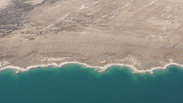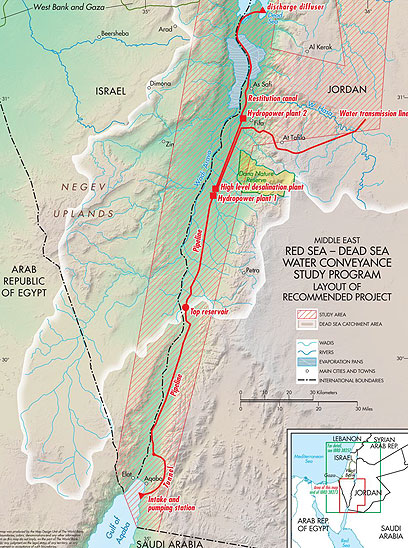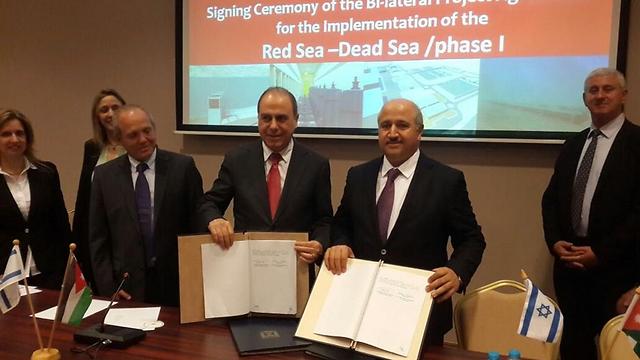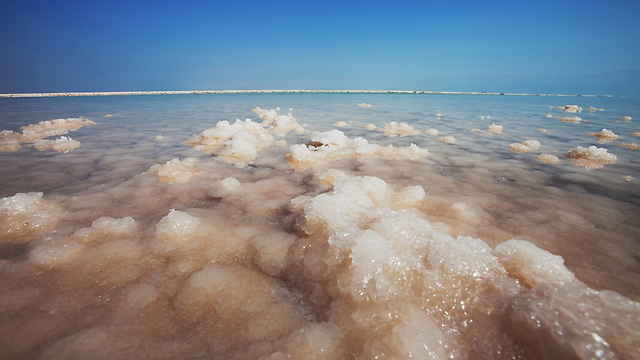
Jordan, Israel sign deal to help save Dead Sea
Two Seas Canal will help rehabilitate Dead Sea by pumping water from Red Sea, provide solutions to Jordan's chronic water problems.
Jordan and Israel signed a deal on Thursday to build a pipeline to link the Red Sea with the shrinking Dead Sea and combat regional water shortages. The official Petra news agency said that the agreement signed in the Jordanian capital, Amman, would set in motion the implementation of the first phase of a long-awaited project.
The Red Sea–Dead Sea Conduit also known as the Two Seas Canal will carry some 100 million metric cubes of water to the north annually, thus hopefully slowing down the process Dead Sea's desiccation. As part of the cooperation, a joint water purification plant will be formed and Israelis, Jordanians and Palestinians will share the water.
It follows a letter of intent signed in Washington in December 2013 by representatives from Israel, Jordan and the Palestinian Authority that capped more than a decade of negotiations. The agreement, signed in the presence of representatives from the United States and the World Bank, stipulates the construction of a canal to channel water from the Red Sea to the Dead Sea.

Jordanian Water Minister Hazem Nasser said that 300 million cubic meters of water would be pumped annually from the Red Sea during the first phase of the project. In all four pipelines would be built, with the ambition of eventually pumping two billion cubic meters of water when the project is completed.
Related stories:
- Israel, Jordan, PA sign historic Red Sea-Dead Sea canal deal
- World Bank says Red-Dead project feasible
- Dead Sea faces shrinking, flooding
The Dead Sea, the lowest and saltiest body of water in the world, is on course to dry out by 2050. The degradation of the Dead Sea started in the 1960s when Israel, Jordan and Syria began to divert water from the Jordan River, the Dead Sea's main supplier.
As part of the project, some of the water pumped from the Red Sea would enter the Dead Sea while the rest would be desalinated and shared with Israel and the Palestinian Authority. The Palestinians are expected to obtain 30 million cubic meters of potable water annually thanks to the project.
Nasser said Jordan will start drawing up documents in the next few weeks calling for international tenders. He said the deal, signed for Israel by Energy and Water Resources Minister Silvan Shalom, safeguards Jordan's national interests.
Shalom, who is also minister of regional cooperation, hailed the agreement as a landmark deal between Israel and Jordan, which signed a peace treaty in 1994. He said the deal will help rehabilitate the Dead Sea and provide solutions to Jordan's chronic water problems, a statement said.
Two years ago, Jordan's water ministry said that the tiny kingdom, where 92 percent of the land is desert, would need 1.6 billion cubic metres of water a year to meet its requirements by 2015.
Water is an essential and rare resource for Jordan which has a population of around seven million and growing, as the country takes in refugees from the Syria war.
However, several environmental groups have warned that the project could undermine the fragile ecosystem of the Dead Sea, which they fear could be contaminated by water from the Red Sea.












